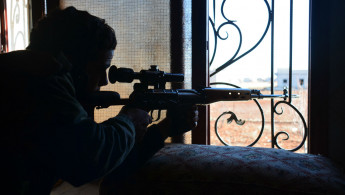First civilians killed in Aleppo since start of ceasefire
An adult and a child have been killed in Syria's Aleppo city in the first deaths in areas covered by a US-Russian-brokered ceasefire since it began this week.
Mohammad Alaa Mesouti was killed in a rebel-held area on Thursday, while a child, whose name has not yet been released, was killed in a regime-held area of the divided city, local activists and monitoring groups said.
"Regime snipers positioned the al-Izaa district fired into the besieged Zabadieh district killing civilian Mohammad Alaa Mesouti and wounding three others," media activist Mohammad al-Halabi told The New Arab.
Halabi added that a further two civilians were wounded in the Bustan al-Qasr district after regime troops shot into the rebel-held neighbourhood.
An opposition source said that this was the first civilian casualty in Aleppo since the cessation of hostilities took effect three days ago.
The Syrian Observatory for Human Rights has confirmed the civilian casualty in rebel-held Aleppo, adding that a child was also killed in the regime-held al-Masharfeh district of the city by sniper fire.
On Thursday, 23 civilians including nine children were killed in regime air raids on a town in eastern Syria held by the Islamic State group [IS].
The truce does not include areas where IS and the former al-Qaeda affiliate Jabhat Fath al-Sham are present.
US President Barack Obama will meet with security aides on Friday amid deep unease over the ceasefire deal.
Barely a week since the US and Russia agreed to halt bombing and let humanitarian aid into Aleppo, the deal's shaky implementation looks set to dominate the meeting which was ostensibly about countering IS.
The agreement has somewhat quieted the bombs over Syria's second city, but aid convoys have not been allowed to reach the roughly 250,000 civilians besieged by regime forces in the rebel-held east.
Basic resources in rebel-held East Aleppo are beginning to run low according to The New Arab's correspondent in the city.
"People are running out of fuel and there are scarce options in the market to buy. Every day it's the same, people think that aid convoys are going to just to enter and bring relief," reported Zouhir al-Shimale.





 Follow the Middle East's top stories in English at The New Arab on Google News
Follow the Middle East's top stories in English at The New Arab on Google News
![Israeli forces ordered bombed Gaza's Jabalia, ordering residents to leave [Getty]](/sites/default/files/styles/image_330x185/public/2176418030.jpeg?h=a5f2f23a&itok=_YGZaP1z)

